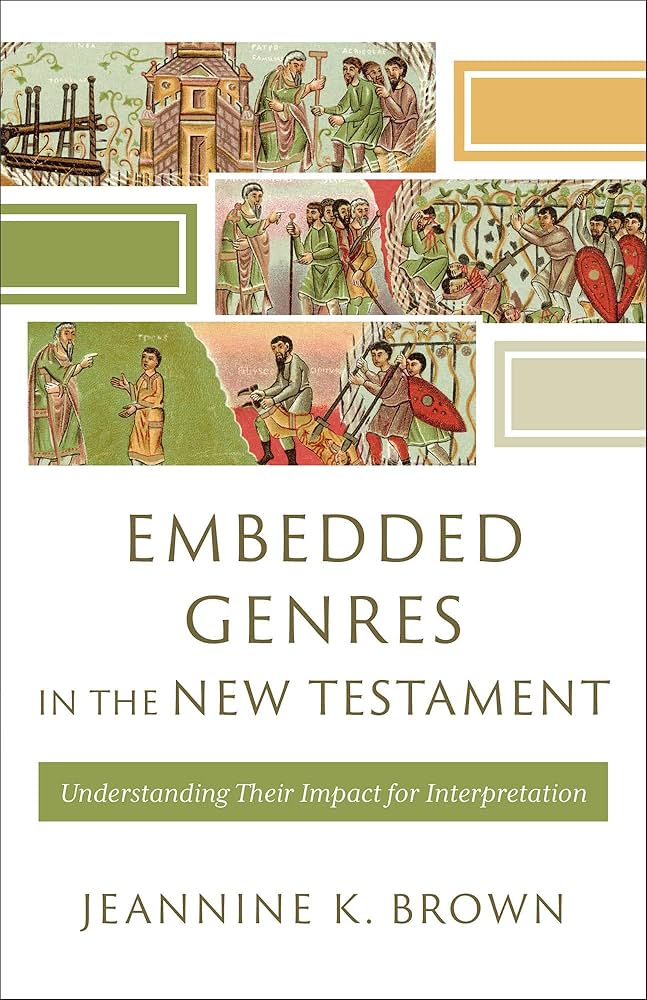Dr. Jeannine Brown’s new book, Embedded Genres in the New Testament: Understanding Their Impact for Interpretation (Baker), was a delight to read and should benefit both scholar and lay Christian alike. What intrigued me the most was the preliminary matter of attempting to identify and sort through various subgenres within larger works, and then how to go about analyzing their interrelationships. As I read the book, I couldn’t help thinking about its potential relevance to the topic of my recent article published on this blog concerning 2 Cor. 5:10. In a nutshell, this would be my analysis.
The overall work, 2 Corinthians, represents an epistolary narrative. In the passage in which 2 Cor. 5:10 appears, that is, verses 1 through 10, and probably beginning as early as verse 16 of the preceding chapter, Paul embarks on the subgenre of apocalyptic discourse. For example, he writes how we “groan” in this earthy tent longing to put on our heavenly bodies in which our mortality will be swallowed up by life. Paul writes of our allegiance to the Lord whether we are in the body or out of the body, and how it is always our goal to please him. Paul concludes in verse 10 with a reference to our appearance before the judgment seat of Christ. How are we to read this?
I would suggest the following. The language of the subordinate clause in verse 10 is difficult. Indeed, there are no parallels in all early Christian writings, and probably none in all extant ancient Greek texts, where two prepositional phrases appear back-to-back bracketed between two transitive verbs with an article preceding the first phrase and a relative pronoun as the object of the second preposition, and where the article and the relative pronoun share a neuter plural. Windisch in his treatise, Der zweite Korintherbrief, 172, observed that the phrase τὰ διὰ τοῦ σώματος is difficult (schwierig): “Nicht ganz leicht sind die letzten Worte zu lesen und zu fassen: für das schwierige τὰ διὰ τοῦ σώματος.” Furnish was more precise in identifying the nature and source of this difficulty: Furnish, 305: “[T]he syntax of this verse is extremely unclear. The troublesome phrase is the one that mentions the body. In addition to the syntactical problem, one should note that it is quite unique to have bodily existence mentioned at all when the topic is the last judgment, as it is here. Thus, the phrase [τὰ διὰ τοῦ σώματος] calls attention to itself both grammatically and conceptually.”
I would contend that what we see here is an embedded riddle, that is, a statement that is intentionally ambiguous. As Dr. Brown noted in her book on page 55, quoting Elli Maranda, “The riddle image is always conceptually a question, be it syntactically an interrogative or not.” This conceptual ambiguity is heightened by the unusual, indeed possibly unique, phraseology, which later scribes took it upon themselves to alleviate by altering the language (D* F G, fifth century and onward, ἃ διὰ τοῦ σώματος ἔπραξεν, and the earlier Papyrus 46, τὰ ἴδια τοῦ σώματος ἃ ἔπραξεν). Paul, however, was quite capable of a more simplified format for communicating the idea of recompense for one’s earthly activity. Compare Colossians 3:25, κομίσεται ὃ ἠδίκησεν.
So, what are we to make of all this? It is impossible to get inside Paul’s head to try and determine what he was thinking when he wrote the phrase τὰ διὰ τοῦ σώματος as part of this syntactically and grammatically difficult subordinate clause. Here, perhaps, the lay person enjoys an advantage over the scholar. I have noticed that scholars, quite properly so, delineate various theological doctrines based on their authorship, for example, Pauline theology as opposed to John’s theology and so forth. The lay Christian tends to look past this to the nature of scripture as a divinely inspired text. In other words, for us laypeople, the ultimate author is God, and we enjoy no lack of scriptural authority to support our reading. 2 Tim. 3:16: “All Scripture is God-breathed and is useful for teaching, rebuking, correcting and training in righteousness”; Romans 15:14: “For everything that was written in the past was written for our instruction”; and 2 Peter 1:21-22: “Above all, you must understand that no prophecy of Scripture comes from one’s own interpretation. For no such prophecy was ever brought forth by the will of man, but men spoke from God as they were carried along by the Holy Spirit.”
So, what was God doing when he guided Paul to insert this unusually awkward syntax around the troublesome phrase, τὰ διὰ τοῦ σώματος? Was it a divinely conceived riddle that at the appropriate time would find its intended audience? Note that others have spotted this issue as well. See, for example, the Aramaic Bible in Plain English: “that each man will be paid in his body anything that was done by him;” and one of the earliest translations, the Coverdale Bible of 1535: “every one may receive in his body, according to what he hath done.” While the reading in these two sources admittedly represents the overwhelming minority view of this passage, and the reading from the Aramaic Bible in Plain English is taken in the first instance from the Aramaic and not the Greek, they do suggest at a minimum that at least to some translators a gray area exists in the conventional treatment of this passage that needs to be more fully examined. My article suggests that this more complete examination leads inevitably to the conclusion that Christ’s Judgment referenced in 2 Cor. 5:10 is a bodily judgment conducted by Christ on believers in this life, as opposed to some post-death, apocalyptic tribunal. When Christ said to the repentant thief on the cross, Today, you will be with me in paradise, he did not qualify his statement by adding, Of course, you need to appear before the Great White Throne first and maybe endure some preliminary, intermediate state for an indeterminate period. I don’t wish to be flippant, but I think Christ has already solved for us the riddle embedded in 2 Cor. 5:10.





Leave a Reply
Your email is safe with us.